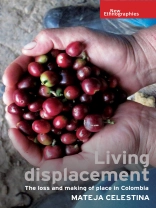Focusing on two cases of resettlement in rural Cundinamarca, Colombia, this book examines how displaced campesinos make sense of their displacement and how displacement shapes their everyday lives. It is based on a ten-month fieldwork employing ethnographic methods working, living and sharing with the displaced and their host. The book calls for a longer time-frame analysis of the phenomenon of displacement, which considers people’s lives both pre- and post- physical relocation. It examines how violence and terror altered people’s sense of place and set off displacement process before they actually moved. It analyses the challenges the displaced are facing in their subsequent place-making endeavours, including the negotiation of social relations, consequences of categorization, engagement with the physical land, and memories of violence to challenge the notion that displacement starts with uprooting and terminates with resettlement or return.
Inhoudsopgave
1. Introduction: reconceptualising displacement
2. Traversing the landscapes of (dis)trust
3. Displacement as an unwinding process
4. The road to Porvenir and Esperanza: the struggle for land
5. The making of a desplazado
6. Desplazado: to be or not to be
7. Displacement hierarchies: IDP community under question
8. Desplazados and their ‘hosts’: the quest for relational belonging
9. Taming the land
10. The remains of the place and times left behind
11. Conclusion: end of displacement?
References
Index
Over de auteur
Alexander Smith is Lecturer in Sociology at the University of Huddersfield












